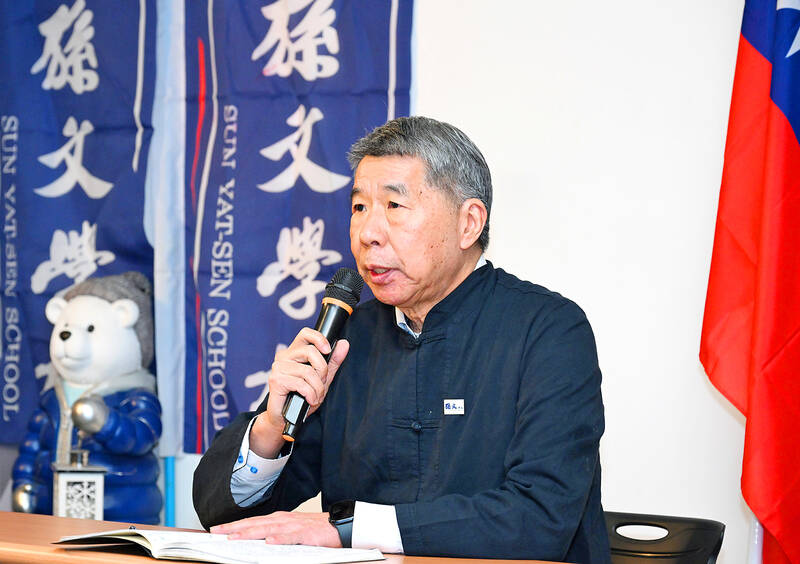Chinese Nationalist Party (KMT) Chairman Eric Chu (朱立倫) should step down to take responsibility for the party losing the presidential election and “make way” for those who can institute reforms, Sun Yat-sen School president Chang Ya-chung (張亞中) said yesterday.
It is evident the KMT has failed to achieve its principal goal — to replace the Democratic Progressive Party (DPP) as the ruling party — and Chu has turned his back on the democratic process and let down the public with his refusal to resign, said Chang, who ran for KMT chairman in 2021. He lost to Chu.
Chang accused Chu of bypassing the party primary to nominate a candidate who was not the best representative in terms of political readiness, personal charisma and experience.

Photo: Tien Yu-hua, Taipei Times
Calls for party solidarity should not be conflated with calls for Chu to resign, as they are separate issues, he added.
Chu has demonstrated that he does not wish to play by the rules and such a person cannot be expected to bring reform, he said.
New Taipei City Mayor Hou You-yi (侯友宜), who was the KMT’s presidential candidate, has said he would take responsibility for the party’s defeat, but has not said how or what kind of responsibility he should shoulder, Chang added.
Chang was also critical of other leading KMT figures, including vice presidential candidate Jaw Shaw-kong (趙少康) and legislator-at-large nominee Han Kuo-yu (韓國瑜), saying that the two, along with Chu and Hou, have not proposed measures to address the party’s situation.
The KMT has failed to own up to its defeat by insisting that it performed well in the legislative elections, he said.
That is a penny-wise, but pound-foolish mindset, he added.
In Saturday’s legislative elections, the DPP secured 51 seats in the 113-seat legislature, the KMT garnered 52 and the TPP won eight. Two were won by independents aligned with the KMT.
The presidential election result was a loss and without a legislative majority, there is nothing the KMT can be proud of, Chang said.
Separately, KMT Cultural and Communications Committee Director-General Lin Kuan-yu (林寬裕) said that the elections made the KMT the most united it has ever been.
The party should not focus on internal conflicts and should present helpful and constructive criticism to help it continue its reform, Lin said.
Additional reporting by CNA

Eight restaurants in Taiwan yesterday secured a one-star rating from the Michelin Guide Taiwan for the first time, while three one-star restaurants from last year’s edition were promoted to two stars. Forty-three restaurants were awarded one star this year, including 34 in Taipei, five in Taichung and four in Kaohsiung. Hosu (好嶼), Chuan Ya (川雅), Sushi Kajin (鮨嘉仁), aMaze (心宴), La Vie by Thomas Buhner, Yuan Yi (元一) and Frassi in Taipei and Front House (方蒔) in Kaohsiung received a one-star rating for the first time. Hosu is known for innovative Taiwanese dishes, while Chuan Ya serves Sichuan cuisine and aMaze specializes

STATS: Taiwan’s average life expectancy of 80.77 years was lower than that of Japan, Singapore and South Korea, but higher than in China, Malaysia and Indonesia Taiwan’s average life expectancy last year increased to 80.77 years, but was still not back to its pre-COVID-19 pandemic peak of 81.32 years in 2020, the Ministry of the Interior said yesterday. The average life expectancy last year increased the 0.54 years from 2023, the ministry said in a statement. For men and women, the average life expectancy last year was 77.42 years and 84.30 years respectively, up 0.48 years and 0.56 years from the previous year. Taiwan’s average life expectancy peaked at 81.32 years in 2020, as the nation was relatively unaffected by the pandemic that year. The metric

Taiwan High Speed Rail Corp. (THSRC) plans to ease strained capacity during peak hours by introducing new fare rules restricting passengers traveling without reserved seats in 2026, company Chairman Shih Che (史哲) said Wednesday. THSRC needs to tackle its capacity issue because there have been several occasions where passengers holding tickets with reserved seats did not make it onto their train in stations packed with individuals traveling without a reserved seat, Shih told reporters in a joint interview in Taipei. Non-reserved seats allow travelers maximum flexibility, but it has led to issues relating to quality of service and safety concerns, especially during

A magnitude 5.1 earthquake struck Chiayi County at 4:37pm today, the Central Weather Administration (CWA) said. The hypocenter was 36.3km southeast of Chiayi County Hall at a depth of 10.4km, CWA data showed. There were no immediate reports of damage resulting from the quake. The intensity of the quake, which gauges the actual effect of a seismic event, measured 4 in Chiayi County, Tainan and Kaohsiung on Taiwan's seven-tier intensity scale, the data showed. The quake had an intensity of 3 in Chiayi City and Yunlin County, while it was measured as 2 in Pingtung, Taitung, Hualien, Changhua, Nantou and Penghu counties, the data